HIGHEST GRADE OF FAITH
The "soul" {nefesh} stands in intimate relation to the body, nourishing and upholding it; it is below, the first stirring. Having acquired due worth, it becomes the throne for the "spirit" {ruah} to rest upon, as it is written, "until the spirit be poured upon us from on high" {Isa. 32:15}. And when these two, soul and spirit, have duly readied themselves, they are worthy to receive the "super-soul" {neshamah}, resting in turn upon the throne of the spirit {ruah}. The super-soul stands prominent, and not to be perceived. There is throne upon throne, and for the highest a throne.
The study of these grades of the soul yields and understanding of the higher wisdom; and it is in such fashion that wisdom alone affords the linking together of a number of mysteries. It is nefesh, the lowest stirring, to which the body adheres; just as in a candle flame, the obscure light at the bottom adheres close to the wick, without which it cannot be. When fully kindled, it becomes a throne for the white light above it, and when these two come into their full glow, the white light becomes a throne for a light not wholly discernible, an unknowable essence reposing on the white light, and so in all there comes to be a perfect light.
It is the same with the man that arrives at perfection and is named "holy", as the verse says, "for the holy that are in the earth" {Ps. 16:3}. It is likewise in the upper world. Thus, when Abram entered the land, God appeared before him, and Abram received nefesh and there erected an altar to the like grade {of divinity}. Then he "journeyed toward the South" {Gen. 12:9}, and received ruah. He attained at last to the summit of cleaving to God through neshamah, and thereupon he "built an altar to the Lord", whereby is meant the ineffable grade which is that of neshamah. Then seeing that he must put himself to the test, and pass through the grades, he journeyed into Egypt. There he resisted being seduced by the demonic essences, and when he had proved himself, he returned to his abode; and, actually, he "went up out of Egypt" {Gen. 13:1}, his faith was strong and reassured, and he attained to the highest grade of faith. From that time, Abram knew the higher wisdom, and cleaved to God, and of the world he became the right hand.
The study of these grades of the soul yields and understanding of the higher wisdom; and it is in such fashion that wisdom alone affords the linking together of a number of mysteries. It is nefesh, the lowest stirring, to which the body adheres; just as in a candle flame, the obscure light at the bottom adheres close to the wick, without which it cannot be. When fully kindled, it becomes a throne for the white light above it, and when these two come into their full glow, the white light becomes a throne for a light not wholly discernible, an unknowable essence reposing on the white light, and so in all there comes to be a perfect light.
It is the same with the man that arrives at perfection and is named "holy", as the verse says, "for the holy that are in the earth" {Ps. 16:3}. It is likewise in the upper world. Thus, when Abram entered the land, God appeared before him, and Abram received nefesh and there erected an altar to the like grade {of divinity}. Then he "journeyed toward the South" {Gen. 12:9}, and received ruah. He attained at last to the summit of cleaving to God through neshamah, and thereupon he "built an altar to the Lord", whereby is meant the ineffable grade which is that of neshamah. Then seeing that he must put himself to the test, and pass through the grades, he journeyed into Egypt. There he resisted being seduced by the demonic essences, and when he had proved himself, he returned to his abode; and, actually, he "went up out of Egypt" {Gen. 13:1}, his faith was strong and reassured, and he attained to the highest grade of faith. From that time, Abram knew the higher wisdom, and cleaved to God, and of the world he became the right hand.
[full original text follows... ☟ ]
Volume 1:83b
א
בַּלַּיְלָה, דָּא נֶפֶשׁ דְּאִיהִי שָׁלְטָא בַּלַּיְלָה. אַף רוּחִי בְּקִרְבִּי אֲשַׁחֲרֶךָּ. דָּא רוּחַ דְּאִיהוּ שָׁלְטָא בִּימָמָא.
ב
וְאִי תֵימָא דִּתְרֵין דַּרְגִּין אִנּוּן בִּפְרוּדָא, לָאו הָכִי, דְּהָא דַּרְגָּא חַד אִנּוּן, וְאִנּוּן תְּרֵין בְּחִבּוּרָא חַד. וְחַד עִלָּאָה דְּשָׁלְטָא עֲלַיְיהוּ וְאִתְדַּבָּק בְּהוּ וְאִנּוּן בֵּיהּ (ואקרון) וְאִתְקְרִיאַת נְשָׁמָה, וְכֻלְהוּ דַּרְגִּין סָלְקָאן בְּרָזָא דְּחָכְמְתָא, דְּכַד מִסְתַּכְּלָן אִלֵּין דַּרְגִּין יִסְתַּכֵּל בַּר נָשׁ בְּחָכְמָה עִלָּאָה, וְהַאי נְשָׁמָה עָיִיל בְּהוּ וּמִתְדַּבְּקָן בָּהּ, וְכַד הַאי שָׁלְטָא כְּדֵין הַהוּא בַּר נָשׁ אִקְרֵי קָדוֹשׁ שְׁלִים מִכֹּלָּא. רְעוּתָא חָדָא לְגַבֵּי קוּדְשָׁא בְּרִיךְ הוּא.
ג
נֶפֶ''שׁ אִיהוּ אִתְעֲרוּתָא תַּתָּאָה וְדָא סְמִיכָא בְּגוּפָא וְזָנַת לֵיהּ, וְגוּפָא אָחִיד בָּהּ וְהִיא אִתְאַחֲדַת בְּגוּפָא. לְבָתַר אִתְתַּקְנַת וְאִתְעֲבִידַת כֻּרְסְיָיא לְאַשְׁרָאָה עֲלָהּ רוּחַ בְּאִתְעֲרוּתָא דְּהַאי נֶפֶשׁ דְּאִתְאֲחִידַת בְּגוּפָא, כְּמָה דִכְתִיב, (ישעיה לכ) עַד יֵעָרֶה עָלֵינוּ רוּחַ מִמָּרוֹם.
ד
לְבָתַר דִּמְתַקְּנִי תַּרְוַויְיהוּ, זְמִינִין לְקַבְּלָא נְשָׁמָה. דְּהָא רוּחַ אִתְעֲבִיד כֻּרְסְיָיא לְגַבֵּי נְשָׁמָה לְאַשְׁרָאָה עֲלֵיהּ, וְהַאי נְשָׁמָה אִיהִי סְתִימָא עִלָּאָה עַל כֹּלָּא טְמִירָא דְכָל טְמִירִין. אִשְׁתְּכַח דְּאִית (לה) כֻּרְסְיָיא לְכֻּרְסְיָיא וְכֻּרְסְיָיא לְגַבֵּי עִלָּאָה עֲלַיְיהוּ. וְכַד תִּסְתַּכַּל בְּדַרְגִּין תִּשְׁכַּח רָזָא דְחָכְמְתָא בְּהַאי מִלָּה. וְכֹלָּא הוּא חָכְמְתָא לְאִתְדַּבְּקָא בְּהַאי גַוְונָא מִלִּין סְתִימִין.
ה
תָּא חֲזֵי (לעיל עז ב) נֶפֶשׁ אִיהִי אִתְעֲרוּתָא תַּתָּאָה דְּאִתְדַּבְּקָא בֵּיהּ בְּגוּפָא. כְּגַוְונָא דִנְהוֹרָא דְּבוּצִינָא. דִּנְהוֹרָא תַּתָּאָה דְּאִיהִי אוּכְמָא אִתְדַּבְּקַת בִּפְתִילָה וְלָא אִתְפְּרַשׁ מִנָּהּ וְלָא אִתְתַּקְנַת אֶלָּא בָּהּ. וְכַד אִתְתַּקְנַת בַּפְּתִילָה אִתְעֲבִידַת כֻּרְסְיָיא לִנְהוֹרָא עִלָּאָה חִוָּורָא דְּשַׁרְיָיא עַל הַהוּא נְהוֹרָא אוּכְמָא.
ו
לְבָתַר כַּד מִתְתַּקְנָן תַּרְוַויְיהוּ אִתְעֲבִידַת הַהוּא נְהוֹרָא חִוָּורָא כֻּרְסְיָיא לִנְהוֹרָא סְתִימָאָה דְּלָא אִתְחֲזֵי וְלָא אִתְיְידַע מַה דְּשָׁרָא עַל הַהוּא נְהוֹרָא חִוָּורָא. וּכְדֵין נְהוֹרָא שְׁלִים. וְכָךְ הוּא בַּר נָשׁ דְּאִיהוּ שְׁלִים בְּכֹלָּא. וּכְדֵין אִקְרֵי קָדוֹשׁ, כְּמָא דְאַתְּ אָמֵר, (תהילים ט״ז:ג׳) לִקְדוֹשִׁים אֲשֶׁר בָּאָרֶץ הֵמָּה וְגו'. כְּגַוְונָא דָא בְּרָזָא עִלָּאָה.
ז
תָּא חֲזֵי, בְּשַׁעֲתָא דְּעָאל אַבְרָהָם לְאַרְעָא, אִתְחֲזִיִ לֵיהּ קוּדְשָׁא בְּרִיךְ הוּא כְּמָה דְּאִתְּמָר דִּכְתִיב לַיְיָ הַנִּרְאֶה אֵלָיו, וְקַבִּיל תַּמָּן נֶפֶשׁ וּבָנָה מִזְבֵּחַ לְהַהוּא דַרְגָא. לְבָתַר הָלוֹךְ וְנָסוֹעַ הַנֶּגְבָּה דְּקַבִּיל רוּחַ. לְבָתַר (עד) דְּסָלִיק לְאִתְדַּבְּקָא גּוֹ נְשָׁמָה כְּדֵין וַיִּבֶן שָׁם מִזְבֵּחַ לַיְיָ סְתָם, דָּא הִיא נְשָׁמָה דְּאִיהִי סְתִימָא דְכָל סְתִימִין.
ח
לְבָתַר יָדַע דְּבָעֵי לְאִצְטְרָפָא וּלְאִתְעַטְּרָא בְּדַרְגִּין, מִיָּד וַיֵּרֶד אַבְרָם מִצְרָיְמָה, וְאִשְׁתְּזִיב מִתַּמָּן. וְלָא אִתְפַּתָּא גּוֹ אִנּוּן טְהִירִין, וְאִתְצָרִיף וְתָב לְאַתְרֵיהּ. כֵּיוָן דְּנָחַת וְאִתְצָרִיף, מִיָּד וַיַּעַל אַבְרָם מִמִּצְרַיִם, סָלִיק וַדַּאי וְתָב לְאַתְרֵיהּ וְאִתְדָּבַּק בִּמְהֵימְנוּתָא עִלָּאָה דִּכְתִיב הַנֶּגְבָּה.
ט
מִכָּאן וּלְהָלְאָה יָדַע אַבְרָהָם חָכְמְתָא עִלָּאָה וְאִתְדָּבַּק בְּקוּדְשָׁא בְּרִיךְ הוּא וְאִתְעֲבִיד יָמִינָא דְעָלְמָא. כְּדֵין וְאַבְרָם כָּבֵד מְאֹד בַּמִּקְנְה בַּכֶּסֶף וּבַזָּהָב. כָּבֵד מְאֹד בְּסִטְרָא דְמִזְרָח. בַּמִּקְנֶה בְּסִטְרָא דְמַעֲרָב. בַּכֶּסֶף מִסִּטְרָא דְּדָרוֹם. בַּזָּהָב מִסִּטְרָא דְצָפוֹן.
י
אָתוּ רַבִּי אֶלְעָזָר וְרַבִּי אַבָּא וְכֻלְהוּ חַבְרַיָא וּנְשָׁקוּ יְדוֹי. בְּכָה רַבִּי אַבָּא וְאָמַר וַוי וַוי כַּד תִּסְתַּלַּק מִן עָלְמָא מַאן יַנְהִיר נְהוֹרָא דְאוֹרַיְיתָא. זַכָּאָה חוּלַקְהוֹן דְּחַבְרַיָיא דְּשָׁמְעִין מִלִּין דְּאוֹרַיְיתָא אִלֵּין מִפּוּמָךְ.
יא
אָמַר רַבִּי שִׁמְעוֹן תָּא חֲזֵי, מַה כְּתִיב וַיֵּלֶךָ לְמַסָּעָיו, לְמִפְקַד אַתְרֵיהּ וְדַרְגּוֹי. לְמַסָּעָיו לְמַסָּעוֹ כְּתִיב, מַאן מַסָּעוֹ. דָּא דַרְגָּא קַדְמָאָה דְּאִתְחֲזֵי לֵיהּ בְּקַדְמִיתָא, כְּתִיב הָכָא מַסָּעוֹ וּכְתִיב הָתָם (מלכים א ו׳:ז׳) אֶבֶן שְׁלֵמָה מַסַּע נִבְנֶה. וְהָא אוֹקִימְנָא אֶבֶן שְׁלֵמָה וַדַּאי. מַסַּע כְּמָה דְאִתְּמָר.
יב
וַיֵּלֶךָ לְמַסָּעָיו. (עיין פי' בס' הגלגולים דף ו' ע''ג סוף פ' ו) כָּל אִנּוּן דַּרְגִּין דַּרְגָּא בָּתַר דַּרְגָּא כְּמָה דְאִתְּמָר. מִנֶּגֶב
Labels: Book of Splendor, Ein Sof, Gershom Scholem, Highest Grade of Faith, Jewish mysticism, Kabbalah, nefesh, neshamah, ruah, Sefirot, Shekhinah, Torah, Tree of Life, Zohar
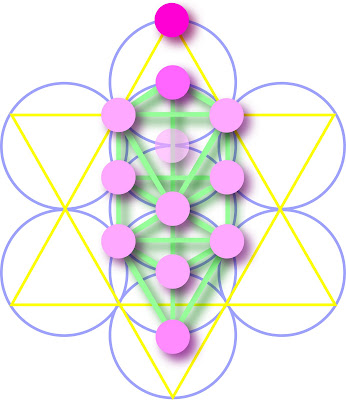

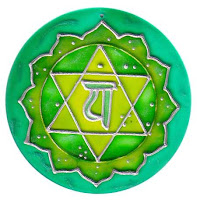

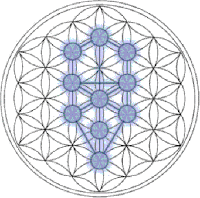

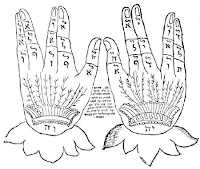

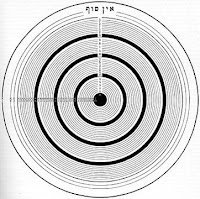
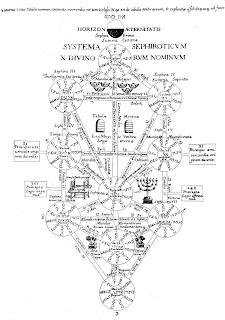
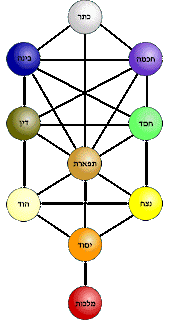
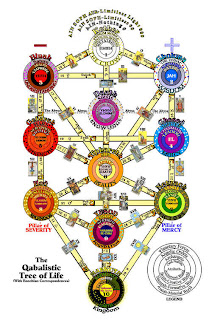

0 Comments:
Post a Comment
Subscribe to Post Comments [Atom]
<< Home